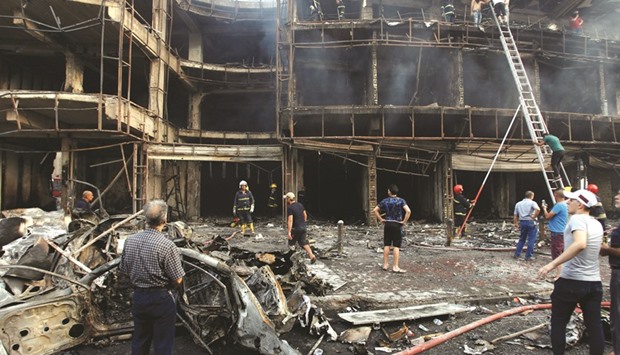A suicide car bombing claimed by the Islamic State group ripped through a busy Baghdad shopping district yesterday, killing at least 119 people in the deadliest attack this year in Iraq’s capital.
The blast hit the Karrada district early in the day as the area was packed with shoppers ahead of this week’s holiday marking the end of the fasting month of Ramadan.
It came a week after Iraqi security forces recaptured Fallujah from IS, leaving Mosul as the only Iraqi city under the militant group’s control.
The bombing also wounded more than 180 people, security officials said.
Prime Minister Haider al-Abadi visited the site of the attack and vowed “punishment” for the perpetrators, his office said.
Abadi’s office later announced three days of mourning for the victims.
The blast set buildings ablaze, and firemen were still working to extinguish them some 12 hours later.
Men carried the bodies of two victims out of one burned building and a crowd of people looked on from the rubble-filled street as emergency personnel worked at the site.
A member of the civil defence forces said that it would take “a number of days” to recover the bodies of the victims.
Hussein Ali, a 24-year-old former soldier, said six workers at his family’s shop were killed, their bodies so badly burned they could not be identified.
“I will return to the battlefront. At least there, I know the enemy so I can fight him.
But here, I don’t know who I’m fighting,” Ali said.
IS issued a statement claiming responsibility for the suicide bombing, saying it was carried out by an Iraqi as part of “ongoing security operations”.
The militant group said the blast targeted Iraq’s Shia Muslim majority.
UN Iraq envoy Jan Kubis condemned the “cowardly and heinous act of unparallelled proportions,” calling on authorities to bring those responsible to justice.
Officials said another explosion in the Shaab area of northern Baghdad killed at least one person and wounded four yesterday, but the cause of the blast was disputed.
US National Security Council spokesperson Ned Price said the attacks “only strengthen our resolve to support Iraqi security forces as they continue to take back territory” from IS.
Bombings in the capital have decreased since IS overran large areas north and west of Baghdad in June 2014, with the militants apparently occupied with operations elsewhere.
But the group has struck back against Iraqi civilians after suffering military setbacks.
A video posted on social media showed men — apparently angry at the government’s failure to prevent the carnage in Karrada — throwing rocks at what was said to be Abadi’s convoy.
A bystander could also be heard cursing at Abadi in another video.
But the premier struck a conciliatory tone over anger directed towards him.
“I understand the emotional feelings and actions that occurred in a moment of sadness and anger,” Abadi said in a statement.
In May, Baghdad was rocked by a series of blasts that killed more than 150 people in seven days.
With thousands of vehicles moving in and out of the city each day, such bombings are difficult to prevent.
But there are also flaws in security measures in the city, especially the continued use of fake bomb detectors at checkpoints years after the man who sold them to Iraq was jailed for fraud in Britain.
Iraqi forces completely recaptured Fallujah, a city 50km west of Baghdad, from the militants a week ago.
Anti-government fighters seized Fallujah in early 2014 and it later became one of IS’s main strongholds in the country.
IS’s defeat there was compounded by a devastating series of air strikes targeting militant forces as they sought to flee the Fallujah area.
Iraqi and US-led coalition aircraft destroyed hundreds of IS vehicles and killed dozens of fighters in two days of strikes against militant convoys after the end of the Fallujah battle, officials said.
With Fallujah retaken, Iraqi forces are now setting their sights on second city Mosul, the last major population centre held by IS in Iraq.
In addition to Mosul, IS still holds significant territory in Nineveh province, of which it is the capital, as well as areas in Kirkuk to its west and Anbar to its south.
The militant group seized control of large parts of Iraq and Syria in mid-2014, declaring an Islamic “caliphate”, committing widespread atrocities and organising or inspiring a series of deadly attacks in Western cities and across the Middle East.

People gather at the site of a suicide car bomb in the Karrada shopping area, in Baghdad yesterday.
